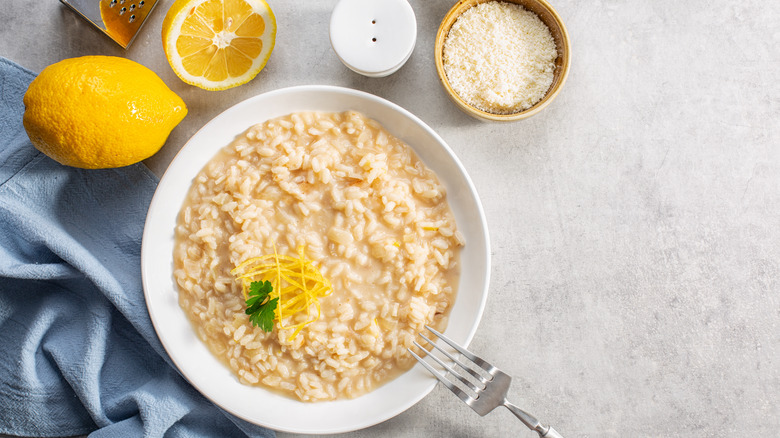What Happens If You Eat A Lemon Peel?
The tangy, tart flavor and multiple health benefits of lemon make it the perfect superfood for everything from smoothies to fresh salads. Ashish Rani, Clinical Dietitian, HCMCT Manipal Hospitals, says, "Vitamins, minerals, and fiber are found in lemon peel, and all of these have a variety of health benefits. The peel of a lemon, in fact, has more nutrients than the fruit or juice" (via Health Shots). The benefits of the lemon's fruit, juice, and essential oil are well documented, as in a 2020 review of 88 clinical studies in Plants.
But what happens if you eat a lemon peel? The United States Department of Agriculture (USDA) says lemon peel contains five to 10 times the amount of key compounds as lemon juice, including magnesium, potassium, Vitamin C, and Vitamin A. So, not only are lemon peels safe to eat, they are super good for you. According to Healthline, lemon peels contain high nutritional value, with only three calories and one carb. However, make sure the lemon peels you consume are organic and unwaxed, so you're not ingesting toxic chemicals and pesticides.
Lemon peel is good for your heart, liver, stomach, and immunity
According to Healthline, lemon peel contains the powerful antioxidants vitamin C and D-limonene. These plant compounds boost immunity, reduce oxidative stress, and protect heart health. 100 grams of lemon peel contains 129 milligrams of vitamin C, which promotes immune system function. The 2020 review in Plants showed that lemon peel can promote digestive health, reduce nausea, neutralize stomach acid, and help with gastric reflux. And a 2018 review in Evidence-Based Complementary and Alternative Medicine showed that one to two grams of Vitamin C can shorten the length of the common cold in children and adults by strengthening immune response to the virus.
Lemon peels contain vitamin C, flavonoids, and pectin fiber that reduce the risk for some types of cancer, particularly stomach cancer (per Healthline). The same compounds may protect heart health by reducing high blood pressure, high cholesterol, and obesity, conditions that increase the risk of heart disease. And a 2017 study in Biomed Research International found that lemon's ability to protect liver function means it can even make a handcrafted cocktail healthier.
Lemon peel can support oral health
In addition to lemon peel's internal health benefits, Healthline suggests its antimicrobial and antibacterial properties may help protect oral health. Streptococcus mutans and other bacteria in the mouth can cause cavities, gum infections, and other oral diseases. Lemon peel's antibacterial components combat Streptococcus mutans and other oral bacteria and block the growth of harmful microorganisms — especially in high doses. A 2018 study in Biomedicines found that the same antibacterial properties help lemon peel battle antibiotic-resistant bacteria. And a similar 2014 study in Spectrochim Acta. Part A Molecular and Biomolecular Spectroscopy showed that lemon peel's antimicrobial agents can combat drug-resistant fungi that cause skin infections.
Lemon peel can even make your smile look healthier. Dentaly recommends using lemon peel to whiten teeth. To do, peel a lemon and cut the peel into pieces small enough to fit inside your mouth. Rub the yellow outside of the peel against teeth, but avoid rubbing against the gums. However, lemon can erode tooth enamel and dentin. Talk to your dentist before using lemon peel to whiten teeth, and don't use it too frequently.
Lemon peels will not get you high
Despite lemon peel's impressive benefits and versatile nature, there are some things lemon peel can't do — like get you high. A TikTok trend from 2021 showed people eating lemon peels to induce euphoria. One BuzzFeed reporter actually tried the trend. While she did notice slight improvements in energy and alertness, the quality of the results didn't match the hype. Dr. Tara Knott told BuzzFeed, "Lemon peels contain fiber, vitamin C, and some minerals. There is a wide range of suggested health benefits from eating lemon peels, but more research is needed. For most people, they are safe to eat, but the euphoric feeling and mood and energy boost are likely a subjective experience."
But that trend was so last year, and One Green Planet echoes Dr. Knott, acknowledging that no current research supports the idea that eating lemon peel can give significant mood-boosting or energizing effects. So, if the TikTok creators trying the lemon peel trend felt anything like euphoria, their observations were likely subjective.
Add lemon peel to your favorite foods
You don't have to eat lemon peels whole or on their own to get the research-backed benefits. Health Shots recommends zesting, peeling, or drying lemon peels for an easy way to store and use lemon peels in your favorite dishes and baked goods. To zest, use a fine grater to shave the yellow part of the peel from the bitter white pith. Freeze zest in an airtight container, and use it to add zing to soups, pasta, smoothies, and more. Mix lemon zest with sugar to make lemon sugar for cookies, cakes, lemon bars, and other sweets. Add zest to crushed black peppercorns and dry in a low-heat oven for homemade lemon pepper (via Fine Dining Lovers).
Dry peels using a dehydrator, or cut into strips and let them dry on a sunny windowsill for two or three days. You can also dry them in a 200-degree oven for 30 minutes. Store dried peels in a bag or container in your spice cabinet. Use dried peels in fruit cakes or to make hot lemon tea, adding honey if desired. You can replace the orange pectin and peel with lemon to make marmalade. And for a fun twist, combine equal parts vodka and lemon peels in a glass jar and let sit for three to five days, shaking daily, to make lemon-infused vodka.





